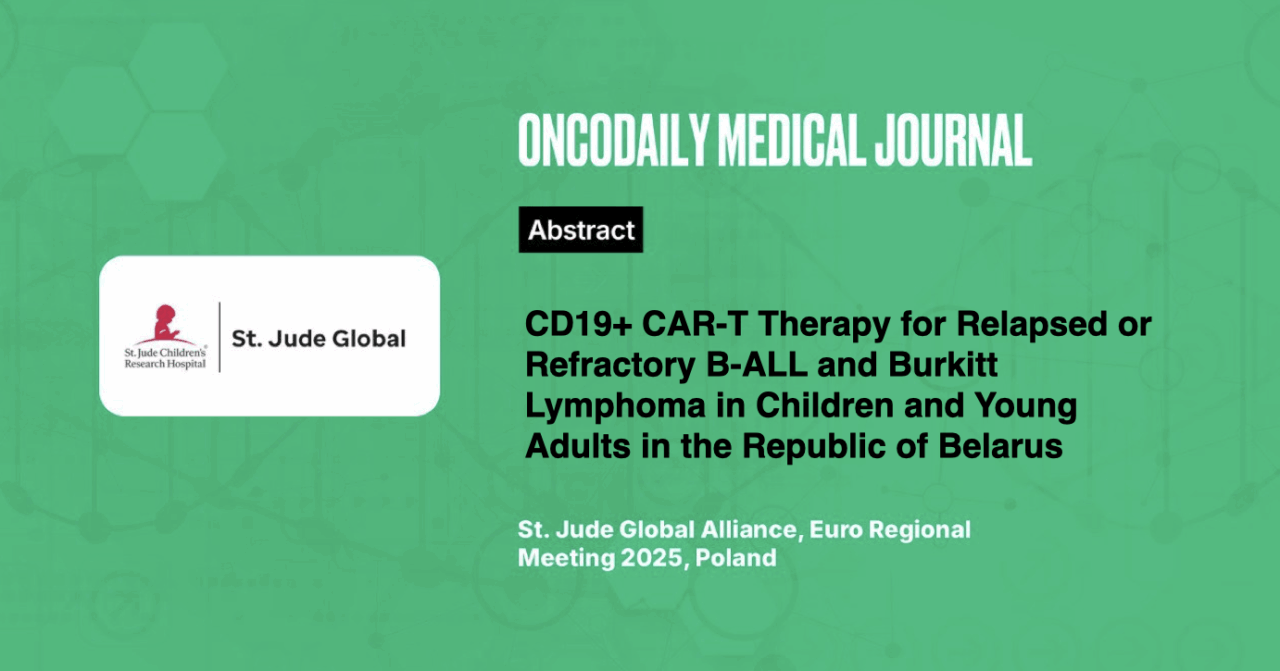CD19+ CAR-T Therapy for Relapsed or Refractory B-ALL and Burkitt Lymphoma in Children and Young Adults in the Republic of Belarus
Abstract
Introduction: The intensification of chemotherapy for relapsed/refractory (R/R) leukemia and lymphoma has not led to improved outcomes for patients. One of the most promising therapeutic approaches is immunotherapy using chimeric antigen receptor T-cells (CAR-T), which exhibit anticancer activity against CD19+ leukemic cells. In 2020, the Belarusian Research Center for Pediatric Oncology, Hematology, and Immunology initiated large-scale efforts to implement CD19+ CAR-T therapy into clinical practice. By 2023, this treatment method was officially approved by the Ministry of Health of the Republic of Belarus, marking a significant milestone in the advancement of leukemia and lymphoma treatment in the country.
Methodology: Seventeen patients, including 15 with R/R B-ALL and 2 with Burkitt lymphoma, received CAR-T therapy. Of these, six patients had previously undergone allogeneic stem cell transplantation (alloSCT). At the time of CAR-T therapy initiation, seven patients were not in remission, six had MRD- positive remission, and four had MRD-negative remission. Lymphocytes were collected and genetically modified using a lentiviral vector delivery system. Before CAR-T infusion, lymphodepleting chemotherapy with fludarabine and cyclophosphamide was administered. To manage cytokine release syndrome (CRS) and neurotoxicity, tocilizumab, anakinra, and corticosteroids were used. The peak absolute CAR-T cell count ranged from 0.06 to 1858 cells/μL, with a median peak expansion time of 10 days.
Results: Three out of 17 patients died before the time of assessment. The overall response rate (ORR) was 86% (12/14 patients), with MRD-negative remission achieved in 71%. Complete response was observed in 11/14 patients, and partial response in 1/14 patients. Two patients were non-responders and died due to disease progression. Among the 12 patients who achieved remission, one patient died of neurotoxicity, six underwent subsequent alloSCT, and three experienced relapse at 3, 4.5, and 5 months after CAR-T therapy. Two of these relapsed patients underwent second CAR-T therapy and alloSCT.
Among the six patients who underwent alloSCT, two relapsed later, with one dying of disease progression, while another received relapsed treatment followed by a second CAR-T therapy. The three- year overall survival rate was 57.8 ± 12.2%. Regarding treatment toxicity, CRS grade 3-4 was observed in 3/17 (18%) patients, and grade 5 in 1 patient. Neurotoxicity grade 3-4 was recorded in 2/17 (12%) patients, with grade 5 in 1 patient.
Conclusion: CAR-T therapy has demonstrated high efficacy in achieving complete remission in patients with R/R B-ALL and lymphoma, serving as an important bridge to subsequent alloSCT. Although toxicity remains a concern, it is manageable with optimal and timely intervention. The findings of this study align with real-world data, confirming the effectiveness and feasibility of CAR-T therapy in improving outcomes for patients with relapsed or refractory leukemia and lymphoma.





